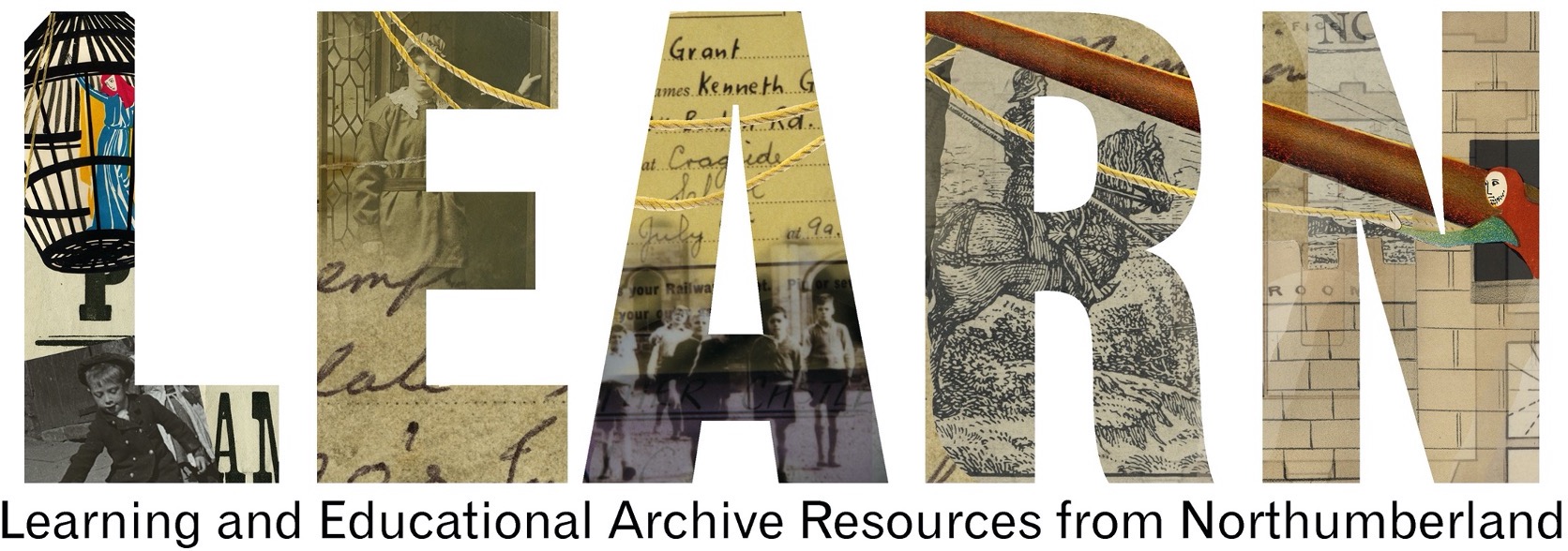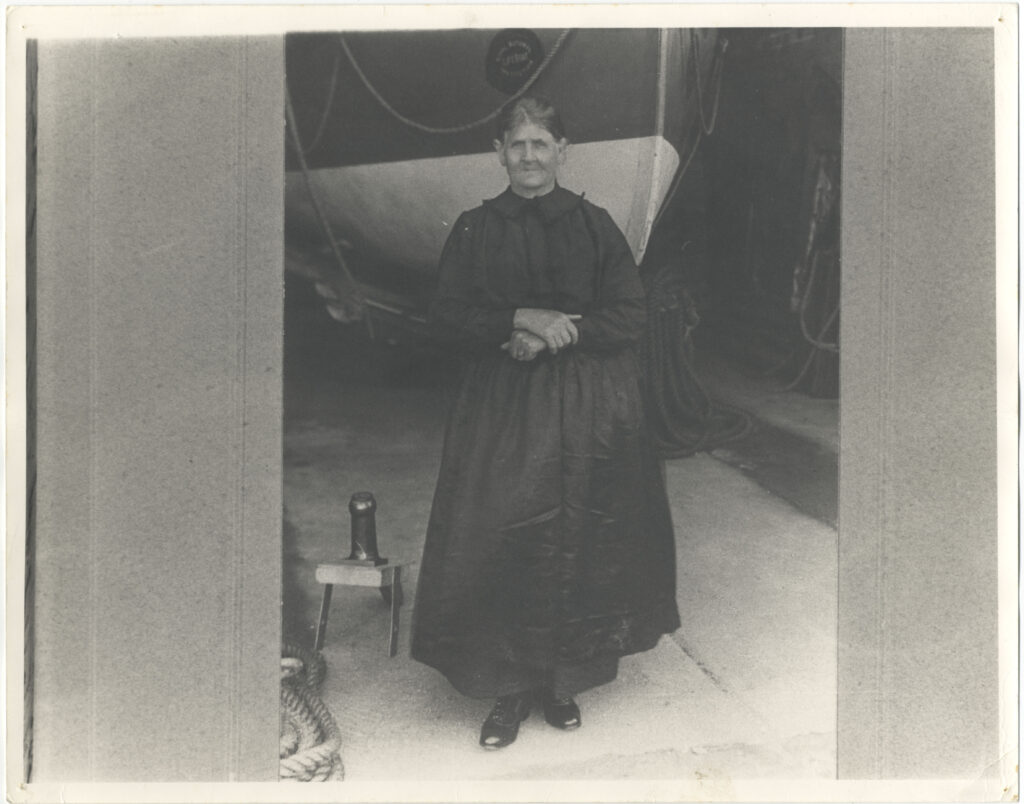Invitation to an Award Presentation to Mrs Margaret Armstrong by the RNLI, 1922
Reference: NRO 8149/5
Suggested age groups: KS1, KS2
Subject areas: Lifeboats, Shipwrecks, Grace Darling, Rescue, Women’s History
Margaret Armstrong, nee Brown, was born in Cresswell in 1849 to a fishing and lifeboat family. Margaret became known as Northumberland’s second Grace Darling following her involvement in the rescue of The Gustav in 1876. Unlike Grace Darling, Margaret Brown’s act of heroism was not widely reported.
In 1876 Margaret was involved in the rescue of crew from a Swedish steamship called The Gustav. Margaret and other Cresswell women formed a human chain to rescue four crew members who were stranded on a capsized boat. Conditions were too difficult for the Cresswell lifeboat to reach the steamship. Margaret and two other women volunteered to walk to the lifeboat station at Newbiggin By The Sea to collect some equipment. Margaret was the only one to reach Newbiggin. The Cresswell lifeboat was able to reach The Gustav and rescued seven men and three women.
This document is a photograph of an invitation to a presentation to Margaret Armstrong by the Royal National Life-Boat Institution, ‘for her constant and willing service over fifty years as a Launcher of the Cresswell Life-Boat.’ The presentation took place on 14 January 1922, forty-six years after Margaret showed great bravery in her involvement in the rescue of crew members of the Swedish steamship ‘The Gustav’. It was noted that Margaret had not missed a lifeboat launch since 1874. She was the first woman to receive an award from the RNLI.
It was not unusual for women to be involved in lifeboat launches. Before motor vehicles were available lifeboats were launched by men, women and horses.
ACTIVITIES
ACTIVITY 1
Background
Margaret Armstrong, nee Brown, was born in Cresswell in 1849 to a fishing and lifeboat family. Margaret became known as Northumberland’s second Grace Darling following her involvement in the rescue of The Gustav in 1876. Unlike Grace Darling, Margaret Brown’s act of heroism was not widely reported.
SEE
See: Who was Margaret Armstrong
See: When was Margaret Armstrong born?
See: What was Margaret Armstrong’s family background?
See: What took place during the rescue of the Swedish steamship The Gustav?
See: How were women historically involved with the lifeboat?
See: What did Margaret Armstrong receive an award for?
See: How long did Margaret Armstrong launch the lifeboat for?
THINK
Think: What does it mean to be a hero?
Think: What makes something a heroic act?
Think: Why was Margaret Armstrong referred to as the second Grace Darling?
Think: Why was Margaret Armstrong’s heroic act not widely reported like Grace Darling’s heroic act?
Think: What would it feel like to be involved in a rescue?
Think: How might Margaret and her companions have felt during the journey to Newbiggin?
Think: How often were women involved in sea rescues in the past?
Think: Why had other women not previously won an RNLI award?
DO
Do: Read through the newspaper story and highlight the key points.
Do: Create a storyboard showing the rescue of The Gustav and Margaret’s journey to Newbiggin.
Do: Use a map to work out how far Margaret and her companions travelled during the storm. Try to plot their route.
Do: Work out how many years took place between Margaret Armstrong’s sea rescue and Grace Darling’s sea rescue.
Do: Create a human chain. How far can you reach? Is it easy or difficult to move around? Can you transport an item down the chain?
Do: Discuss what it would be like to be part of a human chain in a sea rescue.
Do: Design a monument to commemorate Margaret Armstrong’s heroic acts.
Do: Find evidence of other historic stories of women’s involvement in sea rescues.
Resources
OTHER ONLINE RESOURCES
Margaret Armstrong
Lifeboat Magazine Archive article on Margaret Armstrong: https://lifeboatmagazinearchive.rnli.org/volume/24/275/margaret-armstrong-life-boat-heroine
Lifeboat Magazine Archive article on the death of Margaret Armstrong: https://lifeboatmagazinearchive.rnli.org/volume/27/293/mrs-margaret-armstrong-of-cresswell
Chronicle article on Newbiggin Lifeboat Station: https://www.chroniclelive.co.uk/news/history/how-creation-northumberland-lifeboat-station-20202483
Lifeboats
Northumberland Archives blog on Women and Lifeboats: https://northumberlandarchives.com/2021/09/07/women-and-lifeboats/
RNLI home page: https://rnli.org/
History of the RNLI: https://rnli.org/about-us/our-history/timeline
BBC Article on all-female Lifeboat Crews: https://www.bbc.co.uk/news/uk-england-tyne-63991831
Lifeboat Station Project webpage on Women of the RNLI: https://lifeboatstationproject.com/rnli-women/
Grace Darling
RNLI page on the story of Grace Darling: https://rnli.org/magazine/magazine-featured-list/2019/november/the-story-of-grace-darling
Royal Museums Grenwich page on Grace Darling: https://www.rmg.co.uk/stories/topics/grace-darling
RNLI Grace Darling Museum: https://rnli.org/find-my-nearest/museums/grace-darling-museum
BBC Teach Youtube video on Grace Darling: https://www.youtube.com/watch?v=xCL1x7wHQLY&ab_channel=BBCTeach



